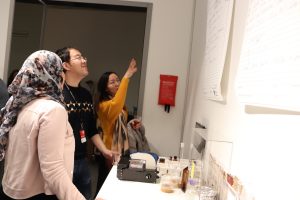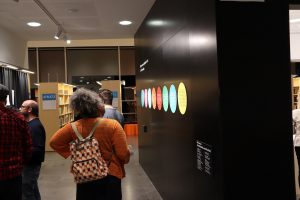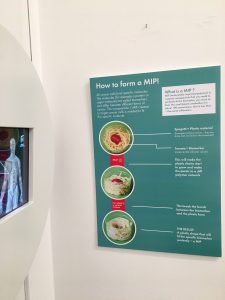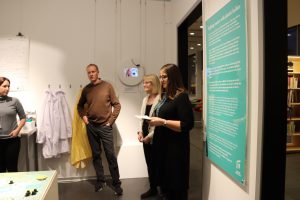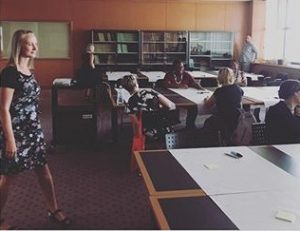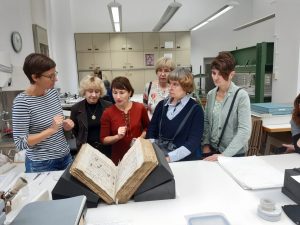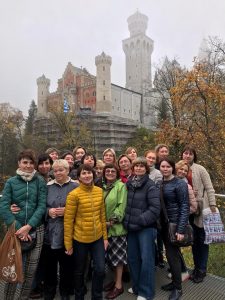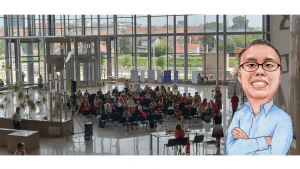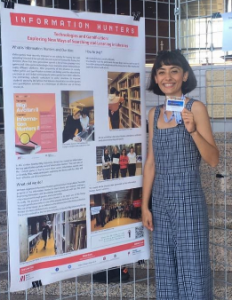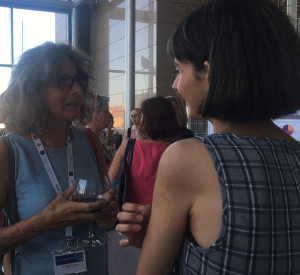Colleagues, we are excited to announce the our second episode of the CPDWL Podcast Project where we feature library and information professionals who support and participate in professional development work.
Our guest is Catharina Isberg. Catherina is the library director of Helsingborg public libraries since 2013. She’s the new chair of the IFLA division IV, a new member of the governing board for the period, 2019 to 2021. Catharina is also a member of the IFLA Management and Marketing Standing committee and previously served in the CPDWL section for eight years in various roles such as Secretary, information coordinator and co-chair. The transcript is below with resources that Catharina referenced Enjoy!
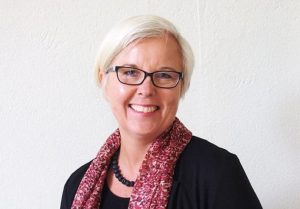
See here for the podcast conversation!
Transcript
Raymond Pun
Hi this is Raymond Pun. Welcome to the CPDWL podcast project! In this space, we talk with library and information professionals to support and participate in professional development work. Today’s guest is Catharina Isberg, Catherina is the library director of Helsingborg public libraries since 2013. She’s the new chair of the IFLA division IV, a new member of the governing board for the period, 2019 to 2021. Catharina is also a member of the IFLA Management and Marketing Standing committee and previously served in the CPDWL section for eight years in various roles such as Secretary, information coordinator and co-chair. Welcome!
Catharina Isberg
Thank you.
Ray
So we’re really excited to have you here and with all the work you’ve done a CPDWL, and everyone is really thankful and appreciative. And from my time there I’ve certainly interacted with you collaborate with you, many times, and from what I’ve been hearing. You’ve been described as very talented very communicative, graceful .If you had to describe yourself using only one word, what word would it be?
Catharina
Actually you used one of them, communicative. I would use that one. So that’s really, that’s really what I think is extremely important in every role that you have.
Ray
Yes, certainly. And, as, as our work dictates today it’s quite a global profession and we’re always communicating with each other from other parts of the world. And, you know, this is something that I think our listeners are really interested to hearing which is what compelled you to become a librarian, how did you get started?
Catharina
Well, that is quite a funny story I would say, My parents and my sisters, they were all teachers, and I didn’t want to go that path, I wanted to do something else. So I went to the student counselor during high school, and said that, “I want to be a lawyer and attorney.” And she started talking with me as an after our discussion I realized “No, I’m not going to be in a tornado. So we went on in the alphabetical list. We started with A for attorney”, with no, and then we came to look at bibliotekarie (librarian in Swedish), and was discussing that. And I said “Yes, that’s good.” So I went for a two week internship, as part of the school year to the public library, and like that, that’s the start of it. I got summer work and then I started my education directly after in the high school. And now, I’m a librarian.
Ray
More importantly, you’re also an international librarian, you’ve been so involved with IFLA, and what does international librarianship mean to you?
Catharina
We are all part of the global arena, and the library and information arena looks much more globally. When it comes to sensation and everything, all information is accessible, or should be accessible, all over the globe. And so, that is really the important part for me, that we get access to information, and that everyone has freedom of expression that you can express, whatever opinions, you have. You should be able to do that. Wherever you are, and in order to do so you need to have accurate information. So for me, in the age of fake news and alternative facts, we all need to become more global and more international in our library work.
Ray
So that’s interesting that you mentioned fake news and alternative facts, and certainly that has been coming up for the past several years, but has that changed, like the vision for you, like when you first started and thinking about international work over the years or it’s been consistently trying to provide information access, so forth?
Catharina
Actually, when I have worked in IFLA and I’ve seen many different parts of the world, I realized how important work is, that really work on it together because I’ve seen that. It’s not a matter of having a lot of money, or all the time. It’s a lot about having your ideas and doing things together, collaborating, discussing things. And to move forward, we can get all those ideas together and really work much more together than we did before. And going to the library outside Cape Town, it gave me so much to get them to take home to my library, and also to see that we have so many things in common, but we also have things that are different from what we’re used to in our daily work. So, I must say that I become much, much more humble, and I really feel that there is much much more to learn from each other. And I thought from the beginning. And the political arena of the world is changing, I really think we need to work even more on this.
Ray
Yeah, certainly, and the fact that you had mentioned IFLA and we had mentioned earlier, your involvement with our section. Now for our listeners, they’re probably really curious for eight years you’ve been involved at CPDWLl, how did you get involved, and why this section?
Catharina
Actually it was because I was part of the Swedish National Library expert committee on CPD issues. And when the World Library Information Congress was going to Gothenburg in 2010, I visited the CPDWL standing committee meeting. And we discuss the work that we had been doing in Sweden, and the CPDWL standing committee in such a work. And by the end of the meeting, I was asked, “Shouldn’t you join the section?” and it went from there. The next year I joined the section. And when I came to that first meeting, I was asked, “Could you be the information coordinator?” And I was.
Ray
Then from there on, you became more involved a secretary and co-chair and conference satellite meeting organizers, is that right?
Catharina:
Yeah, that’s right. It all started that there. I also said when I walked into that first meeting and they said do you want to be an information coordinator? My first question was, but isn’t there anyone else that has been part of this section for longer time that should do it or wants to do it? And I got the answer, no. So, I started to get involved. And it’s just been a lot of fun.
Ray
So, any other memorable moments you have about CPDWL or IFLA that you’d like to share.
Catharina:
Well, actually I would like to share the first time we had the coaching session, We had this drop-in coach, coaching, which we provided for whoever wanted coaching on the congress delegates. And there was one lady that came up to me and we were having our coaching session and I won’t talk about what we were discussing but her gratitude and her thankfulness for this 20 minutes that we spent together, that was really, really, really important to me, and I really enjoyed it a lot and I saw that in those small things, and the small conversations and the network that you have during the conference, you can make a difference.
Ray:
Was that last year in Malaysia?
Catharina:
Yes, that’s right. And this year we had our second coaching session in Athens and it’s really important, as well as the different knowledge cáfes and workshops that we’ve had during the conferences where you really make use of everyone’s knowledge, so that everyone has a voice.
Ray:
Yeah. And we, as for our listeners, we have a webinar on coaching which I believe you spoke last May?
Catharina:
Yeah, just shortly. I was just the kind of introducing the project. We had two coaches that were thinking much more and I would really say that it’s, it’s still available the recording and you should listen to Barbara and Peter who talked about coaching. It’s a really good webinar.
Ray:
Yeah, we have that in the page that you’ll see. So for those listeners, you can click on that link on the page. And so with coaching, that’s something one area that that has been sparking interest for a lot of folks and I’m curious here to hear what are you most excited about in the profession?
Catharina:
Actually, it’s two different things that one thing is to see the change, as the library and information I realize go through. To see that it’s getting more and more important, both on a local level, but also on a national and international level. And the other thing is really to go to my work every day and see the huge difference that we can play. Just for example, walking around in the library, especially in the children area and see the energy, the happiness from all the kids reading books and getting to know new digital devices. For example, today we had the first day of a national holiday for the schools, now they are all out for this week. And it’s called the “reading holiday.” So it’s a five days of reading. And we had all this things and the activities in the library today and just to see the kids. That is really something that excites me a lot about the profession. We make a difference.
Ray:
Yeah, that sounds really cool So is there a hashtag, sort of like a, you know, read “reading day today”, or something that’s trending so that others can see or is it very internal?
Catharina:
No, I am not sure if there is an if it is it’s unfortunately in Swedish. And, but it is a national holiday for, it has been for like four years or something.
Ray:
Right. Okay, that sounds really cool. What’s a professional development tip, or advice that you like to share with others?
Catharina:
Be brave and be brave, all the time. Go outside your comfort zone. And most important, is actually to be brave and go outside your comfort zone in your everyday and work, because I think that development is done in the everyday in the, in the work, and you have to look into your workplace learning and ensure that you take really advantage of all the possibilities, tou have to continuously. Because development is something that we need to do through all of our life. And I learned something new every day.
Ray:
Wow, so that’s great. And, you know, I think a lot of folks had heard that, you know, our section is really involved in professional development guidelines, a lot of webinars and collaborations we do so encourage our listeners to take the advice of Catharina and be brave, check it out and, you know, stay connected with us on social media. It’s a great opportunity to learn what we’re doing, but also in terms of the general professions. And I know we had just talked about this earlier about your, your family encouraging you to think of the profession before librarianship. But what profession, other than librarianship would you like to attempt?
Catharina:
If I would do something else, I would actually go into management consultant or business development or something like that. Because management and leadership is really something that I’m interested in. And I like to see people and business, developing. And so I think that that could be something for me. Maybe?
Ray:
it’s interesting. And we know that you are the new division for chair so congratulations on that. And what is next for you as the division chair, what would you like to accomplish?
Catharina:
Well actually, IFLA is undergoing a huge change. And as officer, I’ve been involved in the global vision and the strategy work, and that now goes into the governance work. And we are looking into how can IFLA optimize the organization, so that we as together all of us can fulfill the vision and mission, both at present time but also for the future. We have to have a good stability and sustainability into the IFLA work. And we also need to ensure a diversity, so that we diversify our membership and make sure that we are really present and engaged in all parts of the world, so that will become truly global. And the most important part as I see it is the professional structures with all the units or the sections like CPDWL is one section. We have a lot of them, and all the special interest groups. That’s the body of IFLA. And in that all the volunteer possibilities that so many people are involved. It’s more than thousand people involved in the work, how can we make room for as many people as possible to contribute to the work of IFLA, that is something that is really important for me.
Ray:
Yeah, that sounds incredible and sounds like a lot of collaboration, and a lot of hard work, coming in for all of us. This is a quite a task but I think this will be interesting to see how we develop going forward. And you know this this time just hearing you explain about your work, your vision, your own sort of a background, we’re really really thankful that you’ve taken the time today to speak with us. And you know this this is a question, probably for our listeners wondering if they wanted to connect with you, where can they find you?
Catharina:
Well, either you can look into the IFLA governing board web page, there is my contact details, but also, of course, it is business, I would suggest LinkedIn. That’s where I am most available when it comes to business contacts.
Ray:
Great, thanks for sharing that. We’ll have those links ready, and thank you again for taking the time to speak with us and to our listeners. Thanks for listening. Please feel free to check out the resources in the page and enjoy the rest of your day.
Catharina:
Thanks.
Resources
CPDWL Coaching Initiatives and Webinar
